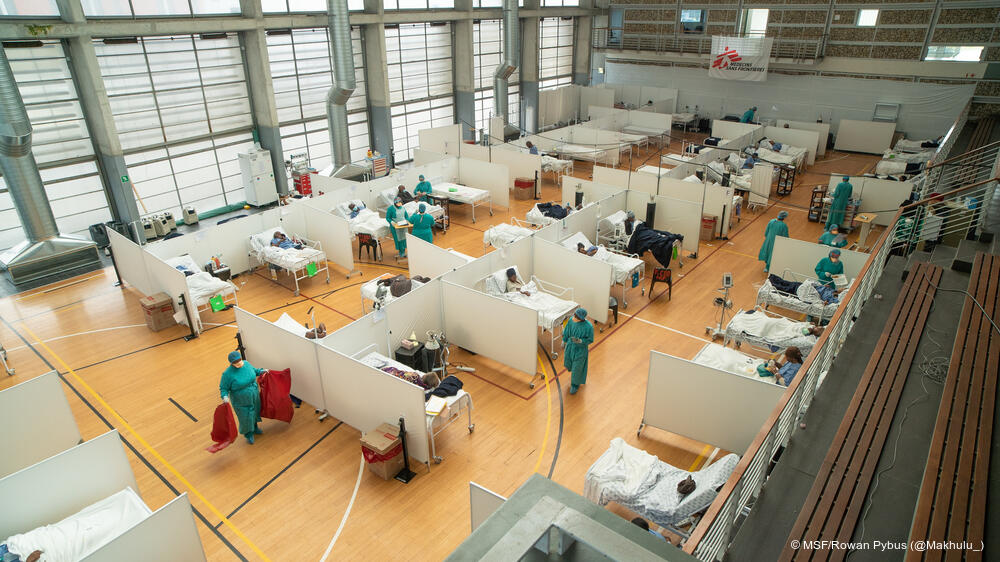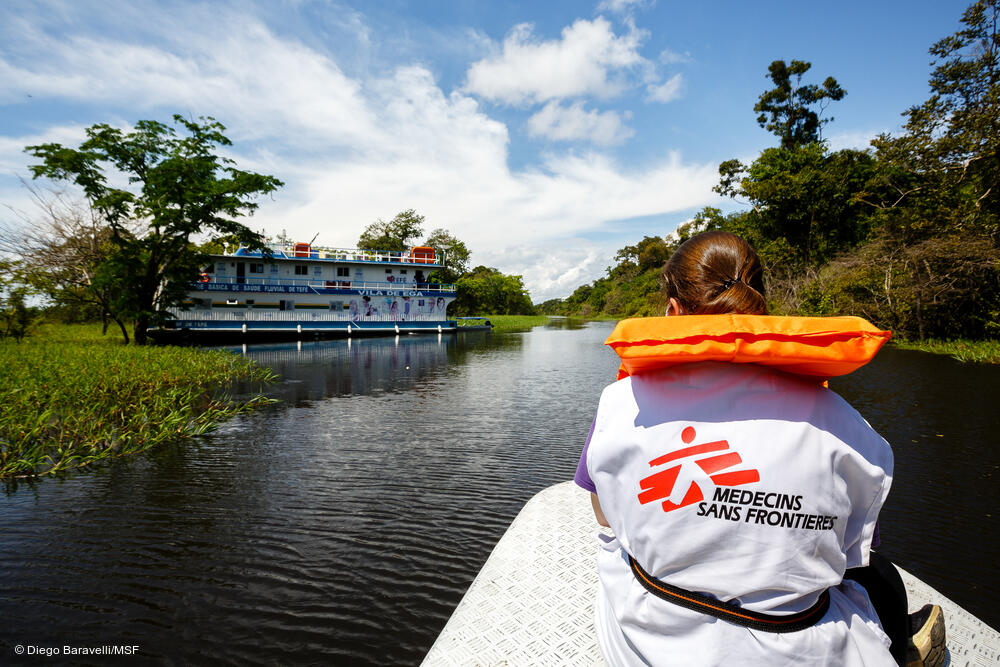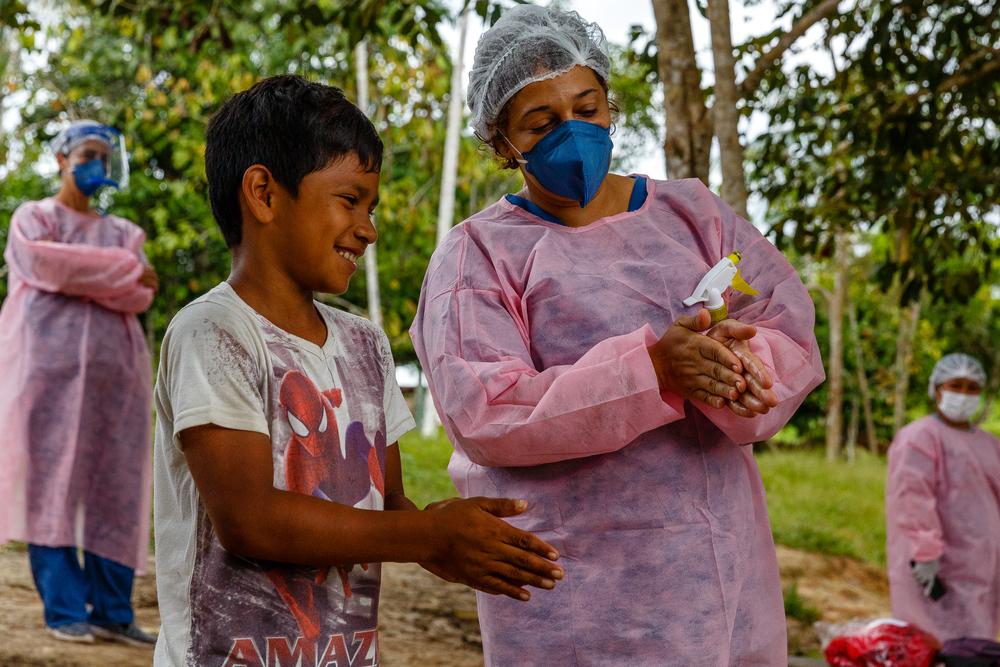The COVID-19 global health crisis continues to hold the world firmly in its grip. In many countries around the world, the initial emergency response has turned into a sustained effort to contain recurring waves of infections, putting a relentless strain on healthcare systems, economies, and social life. From June to August, Médecins Sans Frontières (MSF) continued to respond to the pandemic through its existing programmes, as well as dedicated COVID-19 interventions in more than 250 projects in 63 countries.
The operational focus of MSF’s COVID-19 response remained unchanged. From hard-hit areas to conflict and crisis settings, MSF sought to reach vulnerable populations who were at risk of being left behind, delivering medical care and other assistance to remote communities, people on the move, the homeless, and elderly people living in long-term care facilities. In treatment centres and health facilities across five continents, MSF worked alongside local healthcare workers, strengthening infection prevention and control measures to protect staff, patients and caregivers alike. MSF teams also worked hard to keep other essential health services open and increasingly integrated COVID-19 related activities into regular projects.
Treating patients, supporting hospitals, and reaching vulnerable communities

MSF's Khayelitsha Field Hospital in South Africa played a major role in helping the struggling Khayelitsha District Hospital to cope with the burden of COVID-19for moderate to severe COVID-19 patients to support the local hospital. [© MSF/Rowan Pybus (@Makhulu_)]
Globally, MSF provided technical, training, or material support to more than 600 health facilities from June through August. In an additional 138 hospitals and treatment centres, MSF medical teams treated COVID-19 patients and set up or managed more than 3,300 dedicated beds. More than 48,000 COVID-19 related outpatient consultations and over 30,000 tests were conducted in MSF-supported health facilities and treatment centres worldwide. Just over 7,700 patients required hospitalisation, and 2,793 patients showing severe symptoms and requiring intensive care. More than half of MSF-supported hospitals and COVID-19 treatment facilities were in Africa, followed by the Americas, Asia, and the Middle East. MSF teams also worked in 132 nursing homes and 125 facilities housing migrants, refugees, and homeless people, a majority of which are located in the Americas and Europe. Most of MSF’s dedicated COVID-19 operations in Europe ended in late May.
Reaching out to communities, addressing misinformation and fears about COVID-19, while bringing activities closer to vulnerable groups remained a cornerstone of MSF’s response. MSF outreach teams held more than 350,000 health promotion and community awareness sessions on COVID-19, including door-to-door, phone, and social media campaigns. MSF also distributed more than 2.2 million masks, protective clothing and hygiene items to communities, displaced and migrant populations, and health facilities from June through August.
Despite MSF’s comparatively small contribution to the enormous global pandemic response, COVID-19 presented extraordinary and novel challenges to MSF’s ability to deliver medical and humanitarian assistance. MSF teams faced major uncertainties and dilemmas, spanning from protecting staff and medical personnel, treating COVID-19 patients, and keeping MSF projects and essential healthcare services running. At the same time, the pandemic exposed health systems’ pre-existing weaknesses, exacerbated ongoing humanitarian crises, and put vulnerable populations at particular risk.
Access issues and supply shortages

August 2020, MSF team joined the first trip of the primary healthcare boat (vessel on the left) that assists the population around Tefé in the Amazon region, Brazil [© Diego Baravelli/MSF]
Geographical, political, and conflict-related access barriers posed major obstacles to MSF’s COVID-19 and other activities, from remote communities in the Amazonas region to the wars in Yemen and Syria, to the refugee and migrant camps Greece and the detention centres in Libya. In some areas, mobile technologies and social media offered some alternatives to reach people despite lockdown measures, border closures, and travel restrictions. Delivering medical assistance in remote areas and crisis settings, however, could be exceedingly resource-intensive and was often delayed. The global shortage of medical and personal protective equipment had particularly damaging effects in some low-resource and conflict settings, including Bangladesh, Syria and Yemen, where MSF teams were forced to close urgently needed medical facilities to protect healthcare workers. In several countries with major MSF operations, the lack of protective gear fuelled healthcare workers’ fears of contracting the disease and contributed to shortages of qualified medical personnel. In allocating and transporting crucial medical supplies amid widespread simultaneous needs and a massively disrupted global transportation network, MSF faced extremely complex and difficult logistical challenges.
Offering the best care at the right time
A new virus with little understood transmission paths and very limited treatment options, COVID-19 repeatedly caused unexpected regional spikes and sudden surges in patients requiring specialised care. As a result, choosing where to intervene next and when to scale isolation and treatment capacities involved a great deal of uncertainty. Some activities such as MSF’s response in the Brazilian Amazonas region or in Ecuador were able to be operational only as COVID-19 cases were already decreasing. Meanwhile, several MSF-built treatment centres in Africa and in India saw far fewer patients than expected. Repeated shortages of oxygen, supplies for respiratory support, vital medications, and qualified staff complicated the provision of appropriate care for COVID-19 patients. Offering the best and latest treatments available was equally challenging, with new and often conflicting evidence on transmission and treatment options being published at a staggering rate. In places where MSF ran intensive care units, such as in Venezuela and Yemen, the focus on highly specialised care sometimes came at the price of having limited impact on triage, screening and essential primary health care.
The long shadow of the pandemic
From the very beginning of the pandemic, a primary objective for MSF’s COVID-19 response was keeping facilities open and continuing urgently needed healthcare. MSF had to make tough choices about which of its existing medical services could add dedicated COVID-19 treatment capacity, which of its projects were a priority to continue, and which activities had to be suspended to reduce transmission risks and protect staff. In some countries, such as Eswatini, South Africa and Zimbabwe, expanding community-centred activities and home-based care proved a viable alternative, and could be effectively supported with mobile technologies and phone counselling. Nevertheless, MSF had to reduce or adapt activities in many countries, or temporarily close health facilities due to quarantine measures.
Despite these efforts to ensure continuity of care, COVID-19 has increased existing public health problems and further weakened already fragile health systems in many low and middle-income countries where MSF works. In Afghanistan, Pakistan, Sudan, Syria, and many other countries, high case numbers among healthcare workers led to clinics and hospitals having to close, leaving large, often vulnerable populations without access to care. Lockdown measures further complicated access to care, while fears of contracting the disease at a health facility were exacerbated by rumours and misinformation. As a result, many people decided against or delayed seeking care, often with potentially devastating health consequences.
The new normal of responding to the pandemic

Facing these challenges head on required extraordinary support from staffing coordinators, and procurement and supply specialists, at MSF offices all over the world. With most commercial flights still suspended until the end of July, MSF staff relied on humanitarian charter flights to reach projects around the world. More than 1,400 MSF staff were able to depart for international projects from June to August. Despite limited transportation capacity on international flights, global supply shortages, and extra import restrictions, MSF supply centres packed close to 30 million items for the global COVID-19 response, including personal protective equipment, medical devices, medication, testing material, and specialised laboratory equipment. Items earmarked for COVID-19 preparedness and direct response activities made up about 44 percent of packed supplies for MSF operations globally. More than two-thirds of these items were shipped to MSF operations in humanitarian crisis settings with limited local procurement opportunities.
By the end of August, fundraising teams from 35 MSF offices had raised just under 110 million euro for the COVID-19 Crisis Fund created in March, which aims to raise 150 million euro to pay for the substantial additional costs of both its new COVID-19 interventions and the impact of the pandemic on its ongoing projects. For the period from January to the end of August, the COVID-19 Crisis Fund allocated an estimated 76.7 million euro for actual expenses. Human resources and medical activities in MSF projects together accounted for more than 70% of estimated actual expenses, followed by logistics and sanitation (8%), office costs (8%), and travel and accommodation (6%).
Continued response and looking beyond 2020

In countries where the pandemic continues to put health systems under major strain, such as Brazil and Iraq, MSF continues to operate dedicated COVID-19 treatment and isolation facilities and supports medical facilities and healthcare workers. In light of new waves of infections and high patient numbers, MSF has recently launched or reactivated activities in Belgium, Czech Republic, France, Indonesia, Italy, Jordan, Kyrgyzstan, Lebanon, South Africa, Switzerland and Ukraine.
While efficacious vaccines for COVID-19 now appear within reach, MSF remains concerned about the continued obstacles of ensuring equitable access to COVID-19 vaccines, treatments, and diagnostics. While welcoming the launch of the Access to COVID-19 Tools (ACT) Accelerator and its COVID-19 Vaccine Global Access (COVAX) Facility, MSF has repeatedly called for no patents or profiteering on drugs, tests, or vaccines used in the COVID-19 pandemic, and for governments to suspend and override patents to ensure availability, reduce prices, and save more lives. As the global health crisis continues to amplify and deepen existing inequalities and access issues, both political initiative and realistic implementation plans are needed to guarantee access to vaccines, treatments, and diagnostics for all.
This second accountability report continues the series launched with the first report released in August, covering the period from March to May, and will be continued with additional reports in 2021.
Read the full report : Responding to COVID-19: Global Accountability Report | June - August 2020
